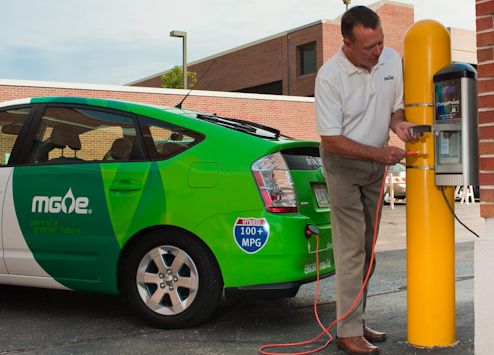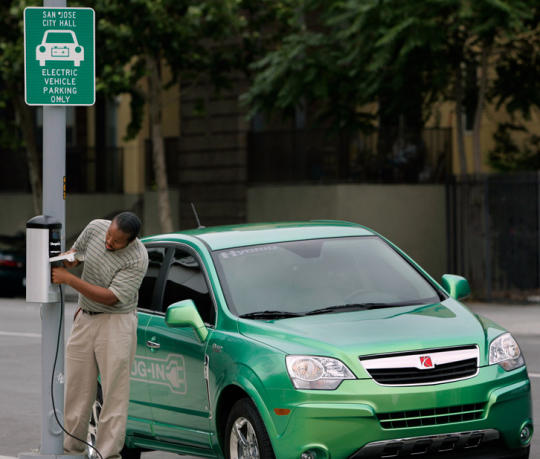
Coulomb electric-car charger, Madison, WI
Plug-In electric car drivers in several regions have enjoyed free public charging at many locations. But lately, some businesses that offer charge stations have started to require payment by credit card.
All of these charging stations were installed with Federal grant funding, so the business owners did not pay anything for what is presumably a way to attract plug-in drivers to their premises.
One example: Walgreen’s drugstore chain has Coulomb ChargePoint stations at many of its California stores. Those stations now cost $2.00 an hour for charging, as do similar Coulomb stations at the Vacaville Outlet Mall.
But because the highest-volume electric vehicles have only 3.3 kW/hour onboard chargers, their owners pay $2 for (at most) 3.3 kilowatt-hours of energy.
The low-volume 2012 Ford Focus Electric and the California-only 2012 Coda Sedan can recharge at 6.6 kW, meaning they can add up to twice as much electric range for that same $2 fee.
This seems like a somewhat inequitable pricing system, whatever the cost. Imagine buying gasoline by the minute, regardless of whether you could pump it in the conventional way or had to add it through a soda straw.
Perhaps with the higher-capacity 6.6-kW inverter coming in next year’s 2013 Leaf, and the 10-kW inverter in the new 2012 Tesla Model S, a rate of $2.00 an hour might be more reasonable.
But for today's Nissan Leaf, Chevrolet Volt, and Mitsubishi i, all limited to 3.3 kW per hour, it translates to a very high price compared to overnight home charging.
“If someone charges at $2 an hour at 3.3 kilowatts, that's 60 cents per kilowatt-hour, which is very expensive," notes Jeff Paul, an energy specialist with the Sacramento Metropolitan Utility District.
He called that rate "paying full price," comparing it to "buying gas for a car that gets 28 mpg.”
Home electric rates vary widely by location and time, but generally run from 3 cents to 25 cents per kilowatt-hour. A Nissan Leaf owner may thus pay as much as 20 times the home-charging rate when recharging at Walgreen's.
Two-dollar-an-hour charging "means paying the same as the driver of a 24-mpg [gasoline] vehicle," notes Mark Williams, an air pollution specialist with the California Air Resources Board (CARB) during an internet discussion of the new fees, and "some folks have said that's OK."

"The difference is that we should also be amortizing the cost of a replacement battery into our fuel costs. If a replacement battery costs $10,000 after 100,000 miles, then our per-mile cost is $0.10 and the 12 miles I can charge in an hour has a built-in replacement cost of $1.20."
"So in reality, we're paying $3.20/hour," Williams concludes, "which is the same as the driver of a 15-mpg [gasoline] vehicle.”
Last week, Sacramento’s municipal parking authority announced it will install 28 Level 2 charging stations in parking ramps around the city center, and they will be free to use. As a further incentive to use emission-free vehicles, Sacramento offers free parking passes to those drivers for some city parking garages as well.
So, what is the reasonable cost for using a charging station at a business setting?
And is it reasonable to use pricing mechanisms to prod electric-car owners to recharge at night, when the electric grid has far more spare capacity than it may on a hot, smoggy, summer afternoon?
Leave us your thoughts in the Comments below.
+++++++++++












